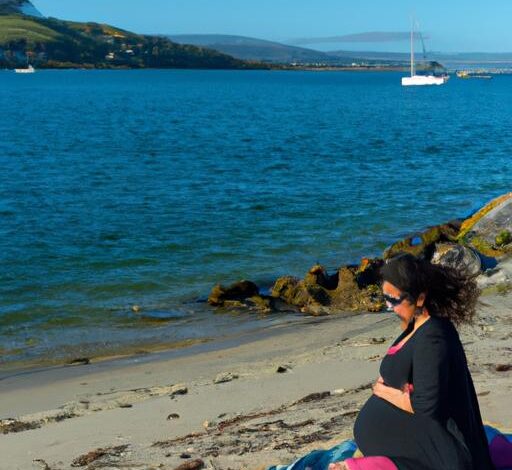When Should You Stop Traveling When Pregnant?

Introduction
As an expecting mother, the allure of exploring new destinations and experiencing different cultures may still beckon you. But when should you hit the brakes on your travel plans? In this article, we’ll delve into the importance of traveling during pregnancy and discuss the concerns and considerations that pregnant travelers should keep in mind.
Importance of traveling during pregnancy
Pregnancy is a transformative journey, both physically and emotionally. It’s a time when self-care and relaxation become paramount. While some may assume that traveling during pregnancy is a no-go, it can actually offer numerous benefits. Traveling allows you to create lasting memories, find solace in new environments, and bond with your partner before the arrival of your little one.
Concerns and considerations for pregnant travelers
Of course, safety and well-being always take precedence. Before embarking on any travel adventure, it’s crucial to consult with your healthcare provider. They can assess your individual circumstances, provide personalized advice, and address any concerns you may have. Additionally, it’s important to consider the following:
-
Timing: The stage of pregnancy plays a significant role in determining the feasibility of travel. Each trimester presents its own set of considerations and potential risks.
-
Health conditions: If you have any pre-existing health conditions or complications during pregnancy, it’s crucial to factor them into your travel plans. Certain conditions may require additional precautions or even restrict travel altogether.
-
Destinations: Not all destinations are created equal when it comes to accommodating pregnant travelers. It’s essential to research and choose destinations that have adequate medical facilities, safe transportation options, and a suitable climate for your well-being.
-
Insurance coverage: Ensure that your travel insurance covers pregnancy-related issues and provides comprehensive coverage for any unexpected events or medical emergencies that may arise during your travels.
By taking these concerns and considerations into account, you can make informed decisions about when and where to travel during your pregnancy. So, let’s dive deeper into each trimester to explore the specific guidelines and precautions you should be aware of.
First Trimester Traveling
General guidelines for traveling during the first trimester
The first trimester of pregnancy is a critical period of development for your baby. While traveling during this time is generally considered safe, it’s essential to follow some general guidelines:
-
Consult with your healthcare provider: Before making any travel plans, consult with your healthcare provider to ensure that traveling is safe for you and your baby. They can assess your individual circumstances and provide personalized advice.
-
Stay hydrated and eat well: It’s crucial to stay hydrated during your travels, especially in the early stages of pregnancy. Carry a water bottle with you and opt for healthy snacks to maintain your energy levels.
-
Take frequent breaks: Pregnancy can cause fatigue, so be sure to take regular breaks and listen to your body. Plan your itinerary accordingly, allowing for sufficient rest periods.
Potential risks and precautions for pregnant travelers
While the first trimester is generally considered safe for traveling, it’s important to be aware of potential risks and take necessary precautions:
-
Nausea and morning sickness: Many women experience nausea and morning sickness during the first trimester. Pack some snacks, ginger candies, or anti-nausea medications to alleviate any discomfort during your journey.
-
Fatigue and dizziness: Hormonal changes and increased blood volume can lead to fatigue and dizziness. Avoid standing for long periods and take breaks to rest whenever necessary.
-
Avoid certain activities: Engaging in activities that pose a risk of falling or injury should be avoided during pregnancy. This includes high-impact sports, extreme activities, and certain amusement park rides.
Symptoms to watch out for during the first trimester
While traveling during the first trimester is generally safe, it’s important to be aware of any concerning symptoms that may arise:
-
Severe abdominal pain: If you experience severe abdominal pain, it could be a sign of a complication. Seek medical attention immediately.
-
Vaginal bleeding: Any vaginal bleeding should be taken seriously and reported to your healthcare provider promptly.
-
Severe nausea and vomiting: If your morning sickness becomes severe, leading to dehydration and an inability to keep food down, consult your healthcare provider.
By following these general guidelines, taking necessary precautions, and being aware of potential symptoms, you can ensure a safe and enjoyable travel experience during the first trimester of your pregnancy.
Second Trimester Traveling
Advantages and Limitations of Traveling During the Second Trimester
The second trimester, spanning from weeks 13 to 28, is often considered the “golden period” of pregnancy. With morning sickness subsiding and energy levels on the rise, many pregnant women find this trimester to be the most enjoyable for travel. Here are some advantages and limitations to keep in mind:
Advantages:
-
Increased energy: During the second trimester, you may experience a surge in energy, making it easier to embark on adventures and explore new destinations.
-
Reduced nausea and discomfort: Morning sickness tends to diminish during this trimester, allowing you to fully savor the delights of travel without constant queasiness.
-
Visible baby bump: As your belly grows, you’ll likely receive more attention and care from others, making it easier to navigate crowded places or receive assistance if needed.
Limitations:
-
Growing physical limitations: While the second trimester is generally a more comfortable time for travel, your body will undergo significant changes. You may experience backaches, swollen feet, or increased difficulty in maintaining your usual level of physical activity.
-
Potential for pregnancy complications: Though the risk of miscarriage decreases after the first trimester, it’s important to remain cautious and aware of any potential complications that may arise.
Safety Measures and Precautions for Pregnant Travelers
While the second trimester may be a more favorable time for travel, it’s crucial to prioritize your safety and well-being. Here are some essential safety measures and precautions to consider:
-
Consult with your healthcare provider: Before planning any trips, consult with your healthcare provider to ensure that you and your baby are in good health for travel. They can provide personalized advice, inform you about any specific restrictions, and address any concerns you may have.
-
Stay hydrated and eat nutritious meals: Proper hydration and a well-balanced diet are essential during pregnancy, especially when traveling. Carry a water bottle with you and make sure to consume nourishing meals to support your well-being.
-
Take regular breaks and listen to your body: Pregnancy can be tiring, so it’s important to listen to your body’s cues. Take regular breaks, stretch, and rest when needed. Avoid activities that may put excessive strain on your body.
Recommended Destinations and Activities for Second Trimester Travel
While the choice of destination ultimately depends on your preferences and comfort level, here are some recommendations for second trimester travel:
-
Relaxing beach getaways: Opt for destinations with serene beaches and comfortable accommodations that offer relaxation and tranquility.
-
City escapes: Explore vibrant cities with a variety of attractions and amenities. Ensure that public transportation and facilities are easily accessible.
-
Nature retreats: Embrace the beauty of nature by visiting national parks, scenic hiking trails, or peaceful gardens that offer gentle activities suitable for pregnant travelers.
Remember, every pregnancy is unique, so it’s crucial to tailor your travel plans to your specific needs and consult with your healthcare provider for personalized advice. By taking necessary precautions and making well-informed decisions, you can enjoy safe and fulfilling travel experiences during your second trimester.
Third Trimester Traveling
A. Factors to consider before traveling during the third trimester
As your pregnancy progresses into the third trimester, it’s essential to carefully evaluate the feasibility of travel. While some women may feel comfortable and have uncomplicated pregnancies, others may face additional considerations. Here are a few factors to keep in mind:
-
Gestational age: The further along you are in your pregnancy, the higher the likelihood of experiencing discomfort, fatigue, and potential complications. It’s generally advisable to avoid long-distance travel during the later weeks of the third trimester.
-
Medical clearance: Before making any travel plans, consult with your healthcare provider to ensure you have medical clearance for travel. They can assess your specific situation, monitor your overall health, and determine if travel is safe for you and your baby.
-
Risk of premature labor: Traveling during the third trimester may increase the risk of premature labor. If you have a history of preterm birth or are at a higher risk, your healthcare provider might advise against traveling long distances or to remote locations.
B. Health and safety guidelines for pregnant travelers
When traveling during the third trimester, prioritize your well-being and take the necessary precautions to ensure a safe journey. Consider the following guidelines:
-
Hydration and nutrition: Stay well-hydrated and maintain a balanced diet during your travels. Pack nutritious snacks and aim for regular, small meals to keep your energy levels up.
-
Comfortable clothing and footwear: Opt for loose-fitting and breathable clothing to accommodate your growing belly. Comfortable footwear is essential to prevent swelling and discomfort.
-
Frequent breaks and movement: Take regular breaks during long journeys to stretch your legs and improve circulation. Prolonged periods of sitting or standing can lead to swollen feet and increased risk of blood clots.
-
Avoid strenuous activities: Engage in light physical activities and avoid any strenuous or high-impact exercises that could potentially harm you or your baby.
C. Recommended modes of transportation and accommodations
Choosing the right modes of transportation and accommodations can significantly enhance your comfort and safety during third trimester travel. Consider the following recommendations:
-
Air travel: If flying, check airline policies regarding pregnant passengers. Many airlines require a medical certificate after the 28th week of pregnancy. Opt for an aisle seat for easier access to the restroom and to stretch your legs.
-
Ground transportation: When opting for ground transportation, choose comfortable and spacious options that allow you to easily change positions and access restrooms.
-
Accommodations: Select accommodations that prioritize comfort and convenience. Consider hotels or rentals that offer amenities such as elevators, comfortable bedding, and proximity to medical facilities if needed.
By considering these factors, following health and safety guidelines, and selecting suitable modes of transportation and accommodations, you can ensure a more comfortable and secure travel experience during the third trimester of your pregnancy.
Special Considerations for High-Risk Pregnancies
Definition and characteristics of high-risk pregnancies
Pregnancy can sometimes come with complications, and certain women may fall into the category of having a high-risk pregnancy. High-risk pregnancies are characterized by various factors, such as maternal age (being under 18 or over 35), pre-existing medical conditions like diabetes or hypertension, multiple pregnancies (twins, triplets, etc.), a history of previous pregnancy complications, or certain genetic disorders.
Travel restrictions and precautions for high-risk pregnant travelers
If you have been identified as having a high-risk pregnancy, it’s important to understand the potential travel restrictions and take necessary precautions. Traveling long distances, especially by air, could increase the risk of blood clots. Therefore, it’s advisable to limit air travel or opt for shorter flights whenever possible. Additionally, it’s crucial to avoid destinations with limited access to medical facilities or those where the quality of healthcare may be questionable.
Moreover, high-risk pregnant travelers should refrain from engaging in activities that may pose a threat to their well-being and that of their unborn child. Activities such as extreme sports, scuba diving, or any strenuous physical exertion should be avoided. It’s vital to prioritize rest, maintain a balanced diet, and stay hydrated throughout the journey.
Importance of consulting with healthcare professionals before traveling
Regardless of whether you have been classified as having a high-risk pregnancy or not, consulting with your healthcare provider before traveling is essential. They can evaluate your specific circumstances, provide personalized advice, and offer recommendations based on your medical history. They may suggest additional tests or precautions to ensure your safety and the well-being of your baby during travel.
Remember, your healthcare provider is your best source of guidance when it comes to making informed decisions about traveling during pregnancy, especially if you have a high-risk pregnancy. Their expertise and knowledge will help you navigate any potential risks and provide peace of mind throughout your journey. So, be sure to schedule an appointment with them well in advance of your planned travel dates.
Now that we’ve explored special considerations for high-risk pregnancies, let’s move on to the conclusion, where we’ll summarize the key points and encourage pregnant women to enjoy safe and fulfilling travel experiences.
Conclusion
When it comes to traveling during pregnancy, it’s essential to strike a balance between adventure and caution. By understanding the importance of traveling during pregnancy and considering the unique concerns for pregnant travelers, you can embark on safe and enjoyable journeys.
Remember, always consult with your healthcare provider before making any travel plans. They can provide personalized guidance based on your individual circumstances and ensure that you and your baby stay healthy throughout your travels.
Whether you’re in the first trimester, enjoying the second trimester’s benefits, or carefully navigating the third trimester, there are travel opportunities available for every stage of pregnancy. Just be sure to take into account the specific guidelines and precautions for each trimester.
While travel can be an enriching experience, it’s crucial to prioritize your well-being and adapt your plans as needed. Take frequent breaks, stay hydrated, and listen to your body’s signals. Remember, it’s not just about the destination; it’s about the journey you take together with your growing baby.
So, when should you stop traveling when pregnant? The answer varies for every woman, as each pregnancy is unique. Trust your instincts, consult with your healthcare provider, and make informed decisions that prioritize the health and safety of both you and your baby.
Embrace the adventure, create cherished memories, and savor the joy of traveling during this remarkable chapter of your life. Bon voyage, mom-to-be!
Conclusion: So above is the When Should You Stop Traveling When Pregnant? article. Hopefully with this article you can help you in life, always follow and read our good articles on the website: Game Zone




